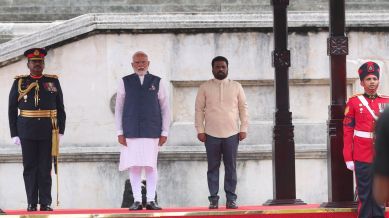As Colombo and Delhi signed pacts on defence cooperation, power, health, digital technology and a special assistance package for the island nation’s eastern provinces, President Anura Kumara Dissanayake, who held bilateral talks Saturday with Prime Minister Narendra Modi, said the Sri Lankan government will not permit its territory to be used in any manner inimical to the security of India and regional stability.
Dissanayake honoured Modi, who headed to Colombo from Bangkok after the BIMSTEC Summit, with the Mitra Vibhushana, Sri Lanka’s highest civilian award to a foreign head of state.
“I reaffirmed Sri Lanka’’s stand that it will not permit its territory to be used in any manner inimical to the security of India as well as towards regional stability.”
Modi said, “We believe that we have shared security interests. The security of both countries is interconnected and codependent. I am grateful to President Dissanayaka for his sensitivity towards India’s interests. We welcome the important agreements made in the area of defence cooperation. We have also agreed to work together on the Colombo Security Conclave and security cooperation in the Indian Ocean.”
Regarding the ethnic Tamil minorities, Modi said, “We also discussed ‘reconstruction and reconciliation’ in Sri Lanka. President Disanayaka apprised me of his inclusive approach. We hope that the Sri Lankan government will meet the aspirations of the Tamil people and fulfil its commitment towards fully implementing the Constitution of Sri Lanka, and conducting provincial council elections.”
Dissanayake said, “We are on a journey towards change, and this is to have a country with economic progress, social equality and justice, and any citizen of the country should have a path towards prosperity in this backdrop. So as historical friends and neighbours, we should work together to develop a prosperous future for our countries and the peoples.”
On the issue of fishermen, Modi said, “We also discussed issues related to fishermen’s livelihood. We agreed that we should proceed with a humane approach in this matter. We also emphasised on immediate release of the fishermen and their boats.”
Story continues below this ad
In this context, Dissanayake sought a ban on fishing by bottom trawlers. “We requested the intervention of Prime Minister Modi… the need to have an intervention regarding the fishermen’s matter… recognising the irreparable ecological damage caused by bottom trawling, which is a banned practice in both countries… required measures (are) to be taken to stop this practice.”
Modi said, “As Prime Minister, this is my fourth visit to Sri Lanka. My last visit in 2019 came at a very sensitive time. It was my firm belief at the time that Sri Lanka will rise, and rise stronger. I applaud the courage and patience of the Sri Lankan people, and today, I am happy to see Sri Lanka back on the path of progress. India is proud to have fulfilled its duties as a true, friendly neighbour. Whether it was the terrorist attack of 2019, the Covid pandemic, or the recent economic crisis, we have stood firmly with the people of Sri Lanka during every difficulty.”
And quoting Thiruvalluvar, he said “in the face of challenges and enemies, there is no stronger assurance than a true friend and the shield of his friendship”.
The Sri Lankan President said he conveyed to Modi that India’s assistance to the island nation in times of need and continuing solidarity are deeply cherished.
Story continues below this ad
Foreign Secretary Vikram Misri said, “Demonstrating our continued commitment to assist Sri Lanka in its economic recovery, India has concluded the debt restructuring process with Sri Lanka, with the exchange of the bilateral amendatory agreements on debt restructuring. We have, as you would be aware, been pursuing an investment-led strategy with Sri Lanka, together with a grant assistance-oriented approach to ensure that Sri Lanka is firmly on the path to sustainable and long-term economic recovery.”
India also firmed up debt restructuring agreements as part of economic assistance for Colombo and decided to reduce interest rates on loans.
Modi said, “In the last six months alone, we have converted loans worth more than USD 100 million into grants. Our bilateral ‘Debt Restructuring Agreement’ will provide immediate assistance and relief to the people of Sri Lanka. Today we have also decided to reduce interest rates. It symbolises that even today, India stands with the people of Sri Lanka.”
For the social and economic development of the eastern provinces of Sri Lanka, a support package of approximately 2.4 billion Lankan rupees will be provided, he said.
Story continues below this ad
The two leaders virtually inaugurated the construction of the Sampur solar power project. They also inaugurated the recently completed temperature-controlled warehousing facility at Dambulla, which is possibly the first facility of its kind in the island, and a project for supply of solar rooftop systems to nearly 5,000 religious institutions across Sri Lanka.
An important agreement that the two sides inked was on developing Trincomalee as an energy hub.
“The Sampur solar power plant will help in Sri Lanka’s energy security. All the people of Sri Lanka will benefit from the agreements signed for building a multi-product pipeline and developing Trincomalee as an energy hub,” Modi said.
The grid interconnectivity agreement between the two countries will open up options for Sri Lanka to export electricity, he said.
Story continues below this ad
Modi said Sri Lanka has a “special place” in India’s Neighbourhood First policy and Vision MAHASAGAR.
“In the last four months, since President Dissanayake’s visit to India, our cooperation has progressed significantly,” he said.
Ahead of the bilateral talks, Modi was accorded a ceremonial welcome at the historic Independence Square in the heart of the Sri Lankan capital, in the first such honour given to a foreign leader. He was received at the Square by Dissanayake.
